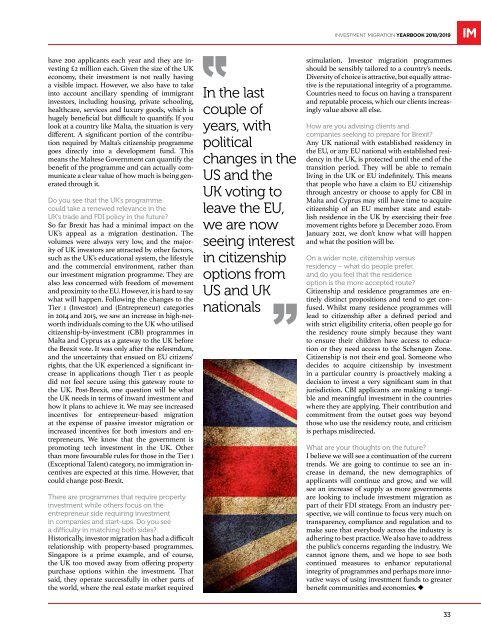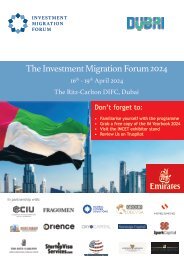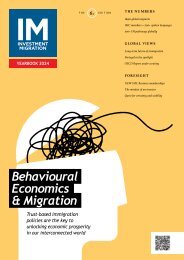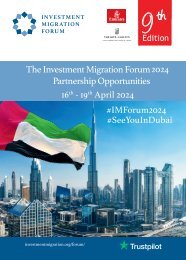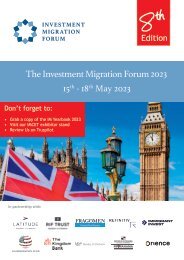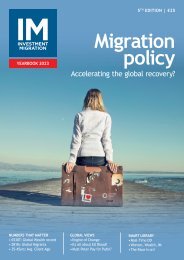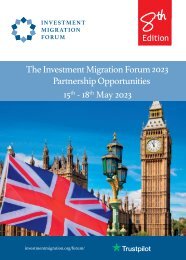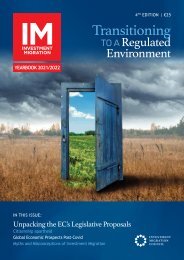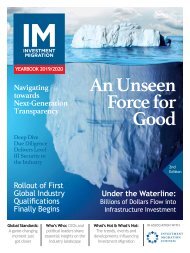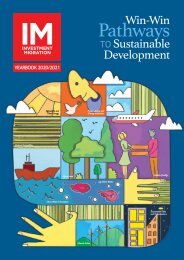IM Yearbook 2018/19
Created out of the need for a global, credible, “go-to” industry publication, the IM Yearbook offers valuable access to a prime target audience of your partners, your peers, and the foremost referral network leading to the world’s most influential RCbI programmes: senior level representatives of the global migration industry, academics, migration agents, migration law firms, wealth managers, UHNWI’s, government representatives, and international organisations involved in migration and citizenship-by-investment.
Created out of the need for a global, credible, “go-to” industry publication, the IM Yearbook offers valuable access to a prime target audience of your partners, your peers, and the foremost referral network leading to the world’s most influential RCbI programmes: senior level representatives of the global migration industry, academics, migration agents, migration law firms, wealth managers, UHNWI’s, government representatives, and international organisations involved in migration and citizenship-by-investment.
- No tags were found...
You also want an ePaper? Increase the reach of your titles
YUMPU automatically turns print PDFs into web optimized ePapers that Google loves.
INVESTMENT MIGRATION YEARBOOK <strong>2018</strong>/20<strong>19</strong><br />
<strong>IM</strong><br />
have 200 applicants each year and they are investing<br />
£2 million each. Given the size of the UK<br />
economy, their investment is not really having<br />
a visible impact. However, we also have to take<br />
into account ancillary spending of immigrant<br />
investors, including housing, private schooling,<br />
healthcare, services and luxury goods, which is<br />
hugely beneficial but difficult to quantify. If you<br />
look at a country like Malta, the situation is very<br />
different. A significant portion of the contribution<br />
required by Malta’s citizenship programme<br />
goes directly into a development fund. This<br />
means the Maltese Government can quantify the<br />
benefit of the programme and can actually communicate<br />
a clear value of how much is being generated<br />
through it.<br />
Do you see that the UK’s programme<br />
could take a renewed relevance in the<br />
UK’s trade and FDI policy in the future?<br />
So far Brexit has had a minimal impact on the<br />
UK’s appeal as a migration destination. The<br />
volumes were always very low, and the majority<br />
of UK investors are attracted by other factors,<br />
such as the UK’s educational system, the lifestyle<br />
and the commercial environment, rather than<br />
our investment migration programme. They are<br />
also less concerned with freedom of movement<br />
and proximity to the EU. However, it is hard to say<br />
what will happen. Following the changes to the<br />
Tier 1 (Investor) and (Entrepreneur) categories<br />
in 2014 and 2015, we saw an increase in high-networth<br />
individuals coming to the UK who utilised<br />
citizenship-by-investment (CBI) programmes in<br />
Malta and Cyprus as a gateway to the UK before<br />
the Brexit vote. It was only after the referendum,<br />
and the uncertainty that ensued on EU citizens’<br />
rights, that the UK experienced a significant increase<br />
in applications though Tier 1 as people<br />
did not feel secure using this gateway route to<br />
the UK. Post-Brexit, one question will be what<br />
the UK needs in terms of inward investment and<br />
how it plans to achieve it. We may see increased<br />
incentives for entrepreneur-based migration<br />
at the expense of passive investor migration or<br />
increased incentives for both investors and entrepreneurs.<br />
We know that the government is<br />
promoting tech investment in the UK. Other<br />
than more favourable rules for those in the Tier 1<br />
(Exceptional Talent) category, no immigration incentives<br />
are expected at this time. However, that<br />
could change post-Brexit.<br />
There are programmes that require property<br />
investment while others focus on the<br />
entrepreneur side requiring investment<br />
in companies and start-ups. Do you see<br />
a difficulty in matching both sides?<br />
Historically, investor migration has had a difficult<br />
relationship with property-based programmes.<br />
Singapore is a prime example, and of course,<br />
the UK too moved away from offering property<br />
purchase options within the investment. That<br />
said, they operate successfully in other parts of<br />
the world, where the real estate market required<br />
In the last<br />
couple of<br />
years, with<br />
political<br />
changes in the<br />
US and the<br />
UK voting to<br />
leave the EU,<br />
we are now<br />
seeing interest<br />
in citizenship<br />
options from<br />
US and UK<br />
nationals<br />
stimulation. Investor migration programmes<br />
should be sensibly tailored to a country’s needs.<br />
Diversity of choice is attractive, but equally attractive<br />
is the reputational integrity of a programme.<br />
Countries need to focus on having a transparent<br />
and reputable process, which our clients increasingly<br />
value above all else.<br />
How are you advising clients and<br />
companies seeking to prepare for Brexit?<br />
Any UK national with established residency in<br />
the EU, or any EU national with established residency<br />
in the UK, is protected until the end of the<br />
transition period. They will be able to remain<br />
living in the UK or EU indefinitely. This means<br />
that people who have a claim to EU citizenship<br />
through ancestry or choose to apply for CBI in<br />
Malta and Cyprus may still have time to acquire<br />
citizenship of an EU member state and establish<br />
residence in the UK by exercising their free<br />
movement rights before 31 December 2020. From<br />
January 2021, we don’t know what will happen<br />
and what the position will be.<br />
On a wider note, citizenship versus<br />
residency – what do people prefer,<br />
and do you feel that the residence<br />
option is the more accepted route?<br />
Citizenship and residence programmes are entirely<br />
distinct propositions and tend to get confused.<br />
Whilst many residence programmes will<br />
lead to citizenship after a defined period and<br />
with strict eligibility criteria, often people go for<br />
the residency route simply because they want<br />
to ensure their children have access to education<br />
or they need access to the Schengen Zone.<br />
Citizenship is not their end goal. Someone who<br />
decides to acquire citizenship by investment<br />
in a particular country is proactively making a<br />
decision to invest a very significant sum in that<br />
jurisdiction. CBI applicants are making a tangible<br />
and meaningful investment in the countries<br />
where they are applying. Their contribution and<br />
commitment from the outset goes way beyond<br />
those who use the residency route, and criticism<br />
is perhaps misdirected.<br />
What are your thoughts on the future?<br />
I believe we will see a continuation of the current<br />
trends. We are going to continue to see an increase<br />
in demand, the new demographics of<br />
applicants will continue and grow, and we will<br />
see an increase of supply as more governments<br />
are looking to include investment migration as<br />
part of their FDI strategy. From an industry perspective,<br />
we will continue to focus very much on<br />
transparency, compliance and regulation and to<br />
make sure that everybody across the industry is<br />
adhering to best practice. We also have to address<br />
the public’s concerns regarding the industry. We<br />
cannot ignore them, and we hope to see both<br />
continued measures to enhance reputational<br />
integrity of programmes and perhaps more innovative<br />
ways of using investment funds to greater<br />
benefit communities and economies. ◆<br />
33


